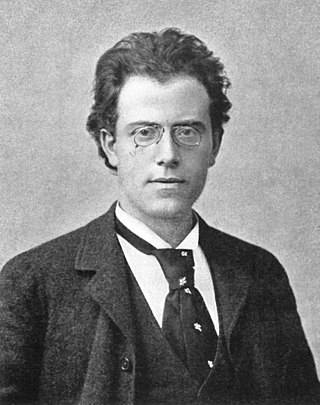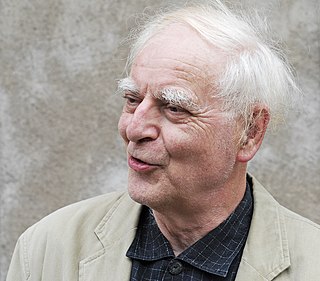Related Research Articles

Lieder eines fahrenden Gesellen is a song cycle by Gustav Mahler on his own texts. The cycle of four lieder for medium voice was written around 1884–85 in the wake of Mahler's unhappy love for soprano Johanna Richter, whom he met as the conductor of the opera house in Kassel, Germany, and orchestrated and revised in the 1890s.

Judith Holfelder-Roy, known by her stage name Judith Holofernes, is a German singer, guitarist, songwriter and author.
German modal particles are uninflected words that are used mainly in the spontaneous spoken language in colloquial registers in German. Their dual function is to reflect the mood or the attitude of the speaker or the narrator and to highlight the sentence's focus.

Adam Gottlieb Hermann Muthesius, known as Hermann Muthesius, was a German architect, author and diplomat, perhaps best known for promoting many of the ideas of the English Arts and Crafts movement within Germany and for his subsequent influence on early pioneers of German architectural modernism such as the Bauhaus.

Gestern war heute noch morgen is a song compilation of the German rock band Böhse Onkelz. It was released on three CDs. The box reached the third position in the German Media Control Charts which is really rare for best-ofs.
Manfred Siebald is a German singer-songwriter and lecturer in American studies in Mainz.

Adolf Muschg is a Swiss writer and professor of literature. Muschg was a member of the Gruppe Olten.

Hans Söhnker was a German film actor. He appeared in more than 100 films between 1933 and 1980. He was born in Kiel, Germany and died in West Berlin, West Germany.

Richard David Precht is a German philosopher and author of successful popular science books about philosophical issues. He hosts the TV show "Precht" on ZDF.
Augustin Pfleger was a German Bohemian composer.

Carola Stern was the name under which Erika Assmus reinvented herself as a serious journalist and (subsequently) author and politically committed television presenter, after she was obliged to relocate at short notice from East Germany to West Germany in 1951.

Lazarus or Die Feier der Auferstehung, D 689, is an unfinished 1820 oratorio by Franz Schubert on a libretto by August Hermann Niemeyer. Intended to be in three acts, only act 1 with twenty-one numbers, and eight numbers from act 2 are extant.

Markolf H. Niemz is a German physicist, biophysicist, and author. He is a full professor at Heidelberg University.

Clara Julia Elisa von Rappard was a Swiss painter. She worked in a wide variety of genres and materials including illustrations, etchings and murals, although she is best known for landscapes and portraits.
Fred K. Prieberg was a German musicologist. He was a pioneer in the field of history of music and musicians under the Nazi regime.
Ulrich Erben is a German painter. From 1980 to 2005, he was a Professor of Painting at the Kunstakademie Münster. He is known as a master of the color field style of abstract painting, closely related to abstract expressionism, in which he creates tension between a defined surface structure, his own method of applying paint to a canvas, and the relationship of various shades of white or color to each other in their placement as part of a composition on the flat plane of a canvas. In 1986 and 2008, he was awarded the Konrad-von-Soest Prize for Visual Arts by the Landschaftsverband Westfalen-Lippe.
Irene Below is a German woman art historian.

Muthesius Academy of Art is an art school and is located in the city of Kiel in Schleswig-Holstein, Germany. The school was named for architect Hermann Muthesius. The school was founded in 1907 as an Arts and Crafts (movement) and handicraft school, the current version of the school including the name and art school status started in 2005.

Oskar Philipp von Chelius (1859-1923) was a Prussian Generalleutnant who served during World War I as an Adjutant of Emperor Wilhelm II and as a military attaché. He also was a composer.

Carola Lentz is a German social anthropologist and, since November 2020, president of the Goethe-Institut. She is senior research professor at the Department of Anthropology and African Studies at Johannes Gutenberg University, Mainz.
References
- ↑ thealit Frauen.Kultur.Labor Theresa Georgen
- ↑ Anja Herrmann: Bühnen des Selbst
- ↑ Theresa Georgen / Carola Muysers (Hgg.): Bühnen des Selbst on SehePunk
- ↑ Ich bin nicht ich, wenn ich sehe on WorldCat